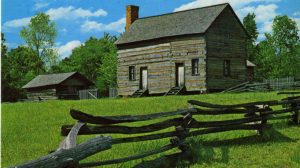Articles

The UNC Charlotte Public Policy Program, in Partnership with Gerald G. Fox Masters of Public Administration Program and the UNC Charlotte Urban Institute, will hold its 2nd annual Talking Policy in the Queen City event on October 2nd from 6:00 to 8:30 p.m. at the Center City campus. This year, guest speaker Dr. Erik Godwin […]

In the past decade, City Council has only denied 27 rezoning petitions out of more than 1,200 filed, according to city records. That means there are more new breweries in Charlotte since 2009 than rezoning petitions turned down.
What’s behind the high approval rate?

In telephone calls, emails and chats over coffee or dinner, dozens of business and community leaders in Charlotte and the surrounding suburban and rural communities regularly communicate — sometimes discussing local issues and sometimes not, in conversations that are happening deliberately. For two decades, the non-profit Lee Institute, which promotes civic engagement, has focused on […]

Mecklenburg County Community Support Services, in partnership with UNC Charlotte Urban Institute, last week released the Housing & Homelessness Ecosystem of community providers in Charlotte and Mecklenburg County. The Ecosystem is one part of a multi-step process in creating a culture of continuous improvement. To read more about why an Ecosystem matters for Charlotte-Mecklenburg, and […]

Are rural leaders different than their urban counterparts? And how can programs that develop leaders bridge the gap between them, if indeed there is one? With leadership emerging as a key issue in research for the Carolinas Urban-Rural Connections project, we asked several leadership programs in the Carolinas about their experiences working with leaders from […]

“The more successful towns have a champion. The really successful ones have multiple champions.” We visited Liz Parham, director of North Carolina’s Main Street Program, to learn about how communities across the state are capitalizing on their cultural and natural assets to revitalize local economies. But it was a different type of asset – people […]

To move up the ladder of opportunity, there’s generally consensus that people need jobs that pay a living wage, where they can grow their earnings over time. But what’s the best way to get workers, especially low-income workers with barriers such as low educational attainment, connected to those jobs? That’s the focus of the ReCONNECT […]

Is there anything more “Charlotte” than bemoaning the closure of local icons? In one of the fastest-growing cities in the U.S., with rising rents and rapid changes in long-established neighborhoods, there’s sure to be a certain amount of churn in the local business scene. Angst and nostalgia are certain to follow. But as it grows […]

You’ve probably heard a few catchy statistics about Charlotte’s explosive growth: For example, the city’s population increased by 47 people a day from 2010 to 2018. But did you know that over the same period, Charlotte also grew by more than a square mile each year? Since 2010, Charlotte’s total land area has increased by […]

Think of an important waterway: You’re probably picturing a rushing river, a huge lake or a roaring waterfall. But what about the humble creek running through the woods near your house? That’s where most of our waterways start, and if those creeks aren’t healthy, our larger waterways won’t be healthy either. Creek Week is a […]

The Charlotte Area Transit System took another step towards expanding the region’s transit network this week, with recommendations for how to extend the Blue Line light rail about five miles through Pineville to Ballantyne. At the Metropolitan Transit Commission, staff presented their preferred routes, which would take the rail line across Carolina Place Mall along […]

Charlotte and the surrounding counties have changed dramatically over the past 250 years, evolving from an agrarian backwater to a manufacturing powerhouse to a hub of global finance. Our first European settlers’ hope was to support themselves by working the land, but 100 years of agriculture showed our predecessors that local farming was much more […]